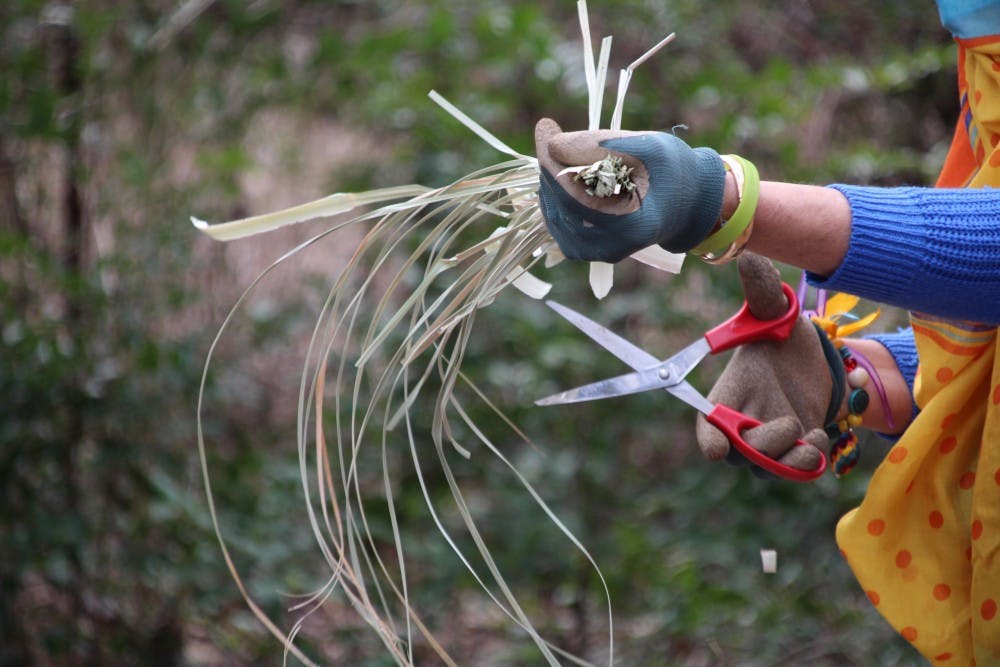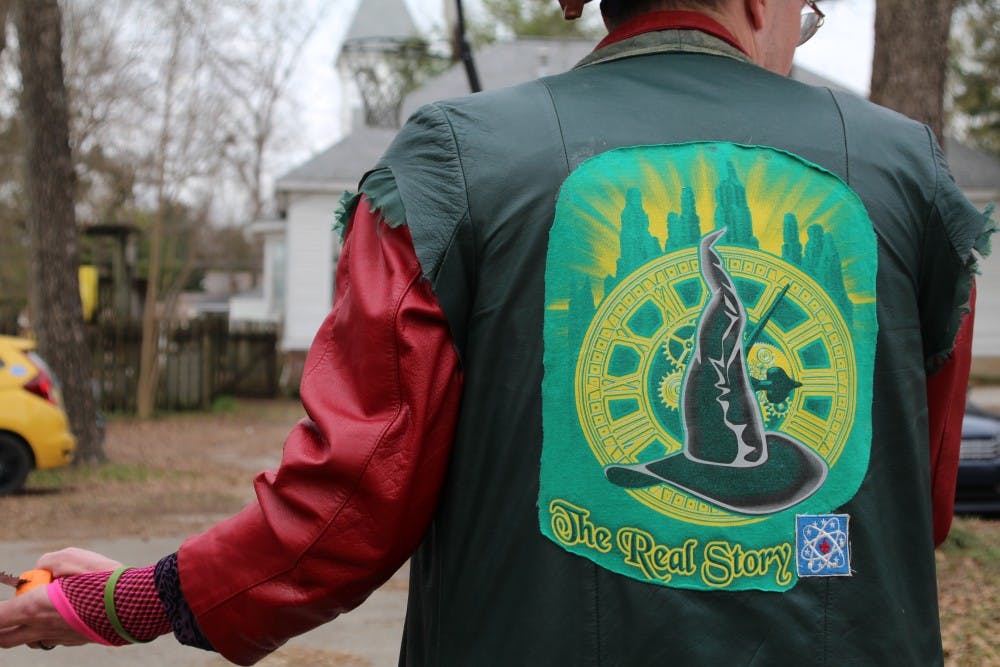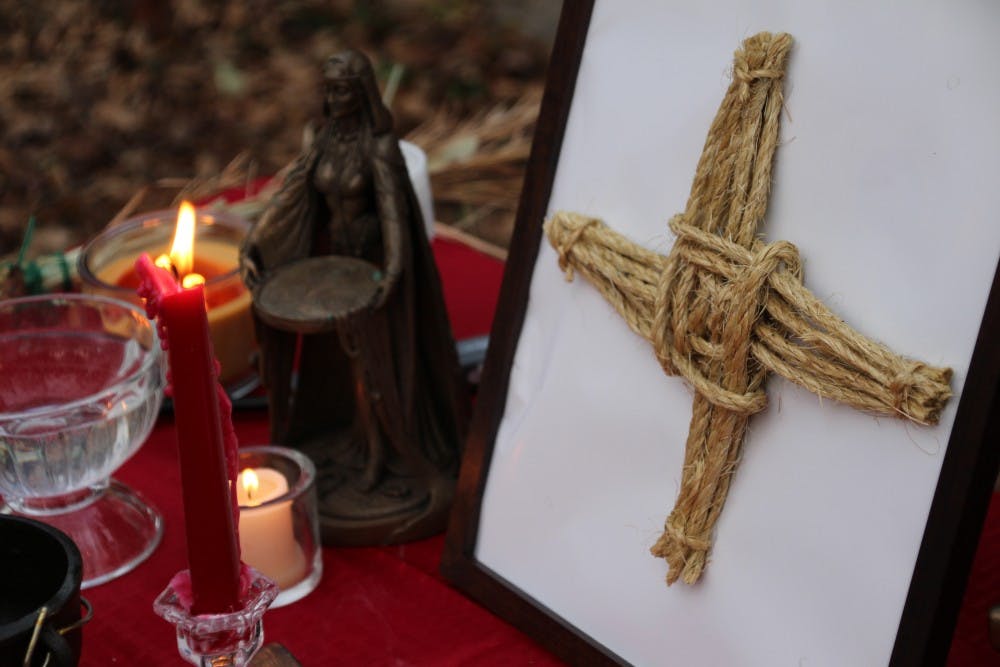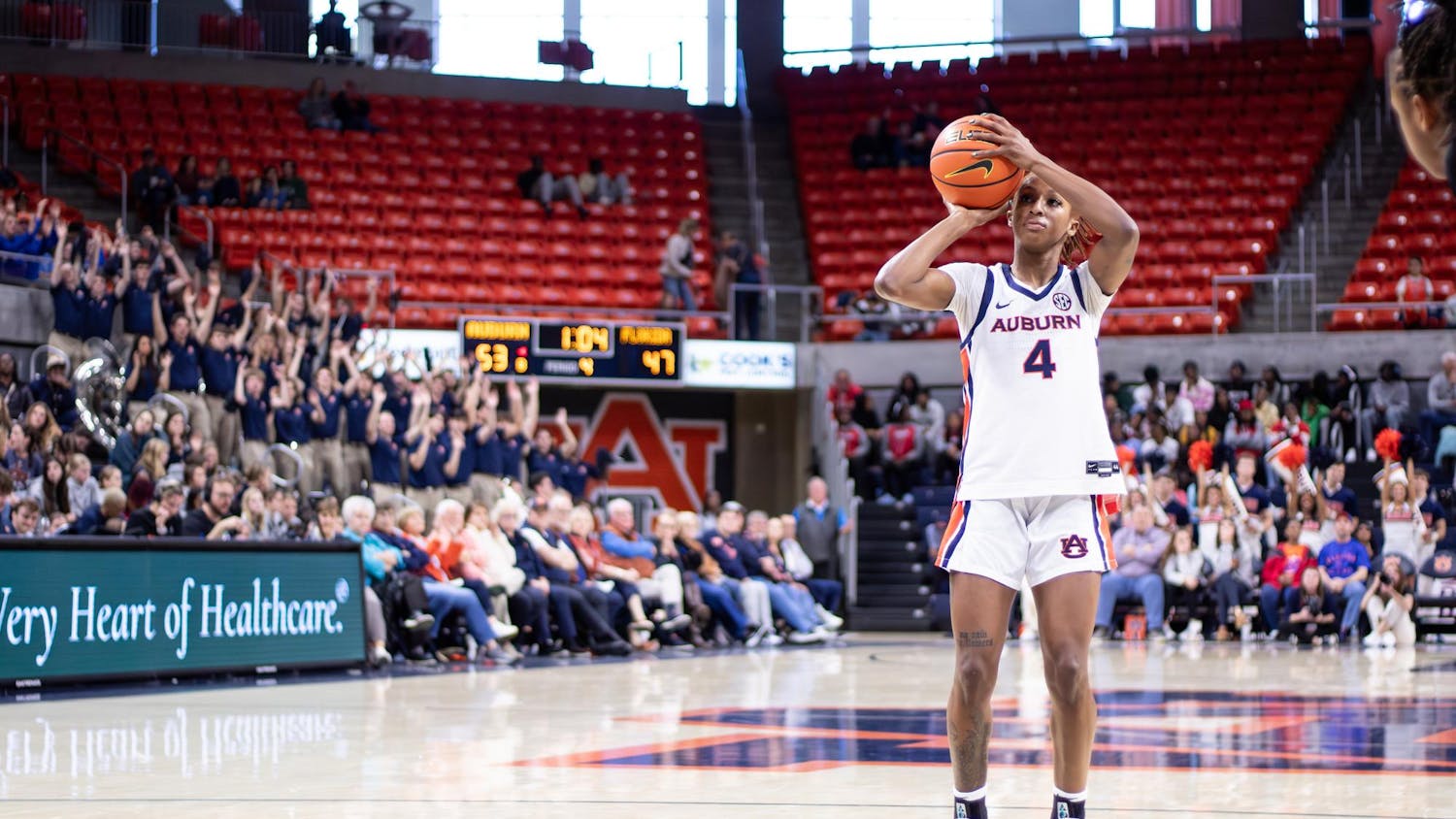Two children play on the wooden steps of a creaky building, laughing and squealing as the moon starts to rise. Their mother calls, and they scurry toward her voice, finding their place in the sacred circle as the smell of incense swirls in the air. It is time for what they came for — the ritual.
This is a meeting of the largest pagan church in Alabama, Church of the Spiral Tree. Based in Auburn, it was founded in 1997 and has remained in town since.
According to its members, pagans are often stereotyped for their beliefs by outsiders and seen as witches or “devil-worshippers.” While some pagans do identify as witches, not all do. Each person follows their own path in the religion.
“You can relate it to how Christianity has a lot of denominations,” said church founder Linda, who asked for her last name not to be printed. “We have wiccans, druids, faerie faith. I’m kind of drawing a blank on some of the names because there are so many, but you get the point.”
The group meets eight times a year for each sabbat on the pagan Wheel of the Year, which symbolize seasonal changes. Today, they’re celebrating Imbolc, the first signs of spring.
According to Gwydion Silverhawk, the church’s ritual coordinator, this holiday is the origin of Groundhog Day. Legend says that on Imbolc every year, a Gaelic deity who controls the weather takes a break to gather her firewood for the rest of the winter. If the weather is sunny on Imbolc, she is taking more time to gather firewood, signaling a longer winter. If it is storming, she has already completed her gathering, and the winter will be shorter.
The actual ritual ceremony is the main event, but the group meets beforehand to make crafts. For this holiday, they make brooms to symbolize sweeping out the season of winter.

Members of the Church of the Spiral Tree engage in broom making on Saturday, Feb. 2, 2019 in Auburn, Ala.
The small group sits on tree stumps planted in a circle as they craft and chat. Church members travel to Auburn from locations across the state, including Huntsville and Tuscaloosa, so this religious meeting is also a reunion of old friends. The last time they met was in December.
One of the most energetic in the group is Kayli Hall, a transgender woman and dedicated pagan. She is cutting branches for the brooms, putting them in a pile for the others to grab from.
As she returns from her car with a saw for the branches, she also presents a drawstring pouch filled with palm-sized, smooth, gray stones. They are magic river stones, she says, to act as a seed for one’s crops in the new season.
Hall, an Opelika resident, was formerly known in town as “The Wizzard” and was noted by her eccentric style of dress. Now, she dresses similarly, yet more feminine. Today, she wears a shimmering purple-and-blue sequin skirt that resembles mermaid scales over a pair of classic blue jeans. She also wears her signature wizard hat, decorated with colorful flowers.
While showing her outfit, she turns around, revealing a patch on the back of her jacket displaying the words “the real story” accompanied by a wizard hat.
The jacket, she says, was always her favorite and got holes in the back after excessive wear. She decided to patch it with a shirt, which she found wrapped around a statue she bought from a thrift store.
“I thought it was perfect because it has a wizard hat with an old-timey clock, which are all aspects of magic that I practice with,” Hall said.
The shirt was originally from a high-school theater play, saying “the real story of Oz” on the back. She decided to trim it to just say “the real story” to symbolize her journey through life.

Hall shows off a jacket that she made on Saturday, Feb. 2, 2019 in Auburn, Ala.
She takes a long drag of her cigarette, then gingerly tucks it behind her ear as she speaks about her path to paganism. It was gradual, she says, but the magic in her was always there. She was raised in a Christian church and later followed Buddhism. From there, she found paganism.
“I was raised with a certain level of mysticism, believing in the power of prayer and healing hands,” Hall said. “Magic’s always been something I’ve loved. I was born as an empath, so I can feel people’s emotions.”
Hall credits paganism with guiding her through life. She realized she was transgender during a meditative ritual in 2008.
She marches to the beat of her own drum in paganism, not following a specific path. In her magic, she finds traditions from various cultures and adapts them to fit into her craft.
“I study things like a scientist,” Hall said. “I study other people’s research, but I don’t take anything from other people’s cultures without giving them credit for it. I look at the principles and understand how it could be done my way without using their religion or their beliefs.”
Other church members have also adapted paganism to fit their personal beliefs. Linda follows the faerie faith, which she described as following aspects of Celtic tradition and working with nature spirits.
“You think of a religion as worshiping a specific entity, and we [faerie faith] don’t do that,” Linda said. “I’m a little bit of an anomaly, kind of like a pagan atheist.”
Some are still finding their path, like 29-year-old Billye Welburn. He runs a vegan restaurant from his home and was first introduced to the church when catering an event for them.
Welburn notes that the people in his life were very quickly accepting of his religion, a luxury many pagans do not experience.
“I have been fortunate to never be in the broom closet,” Welburn said. “By the time I had encountered paganism and took it into my own life, I was at a point where I didn’t really worry about what other people thought.”
This concept of “the broom closet” is something widely discussed among the group. It is why Linda declined to reveal her last name — to protect her identity from others who may look down upon her religion, mainly her employer.
“I don’t want to out myself just yet,” Linda said.
This fear runs deep in the community due to others having negative experiences. In 2014, an Auburn University professor was notably terminated from her job without reason, which she suspected was because the University discovered her pagan beliefs.
“A lot of people who are unfamiliar with paganism have some negative associations about it,” Welburn said. “Some people don’t want to have that stigma affect them.”
Despite this, most members of the church noted Auburn as being more accepting of paganism than other areas of Alabama.
“In the South, there is a kind of religious conservatism that we were born in and small-town mentality, but I think Auburn is one of those towns that’s growing past that,” Hall said. “The University helps.”
The church hosts Pagan Pride Day in Auburn once a year, which gives people in the Auburn community the opportunity to meet the church members, likely breaking down any stereotypes they may have about them.
During the Imbolc ritual ceremony, Silverhawk noted the church’s gratitude for the general acceptance they have in the Auburn community.
“There could come a time when we have to be underground again, but we live in a place where we can celebrate and worship the old gods,” Silverhawk said.
Popular media may depict pagan rituals as an eerie scene, but their ritual was quite the opposite.
The ceremony radiated the same energy as any other main-stream religious meeting. It was serious, yet friendly and light-hearted. Silverhawk told jokes between steps of the ritual, prompting a quick break from stillness for the other church members.
They began by calling on the elements of earth, wind, fire and air to “open the circle.” Silverhawk then delivered a speech about the significance of the holiday, similar to how a Christian preacher would speak to their congregation.
One prominent aspect of the ceremony was the sharing of “cakes and ale.” For the cakes, they shared Little Bites muffins, and for the ale, they shared apple juice instead of an alcoholic beverage, so the children could participate.
They closed the circle, repeating the calling of the elements, while the smell of potluck meals wafted through the air, waiting to be devoured.
Silverhawk then blew out the altar candle as the crowd cheered.
“So, concludes this Imbolc rite. Huzzah!”
Do you like this story? The Plainsman doesn't accept money from tuition or student fees, and we don't charge a subscription fee. But you can donate to support The Plainsman.
Gabby Dance, senior in journalism with a minor in women's studies, is the assistant campus editor of The Auburn Plainsman.





